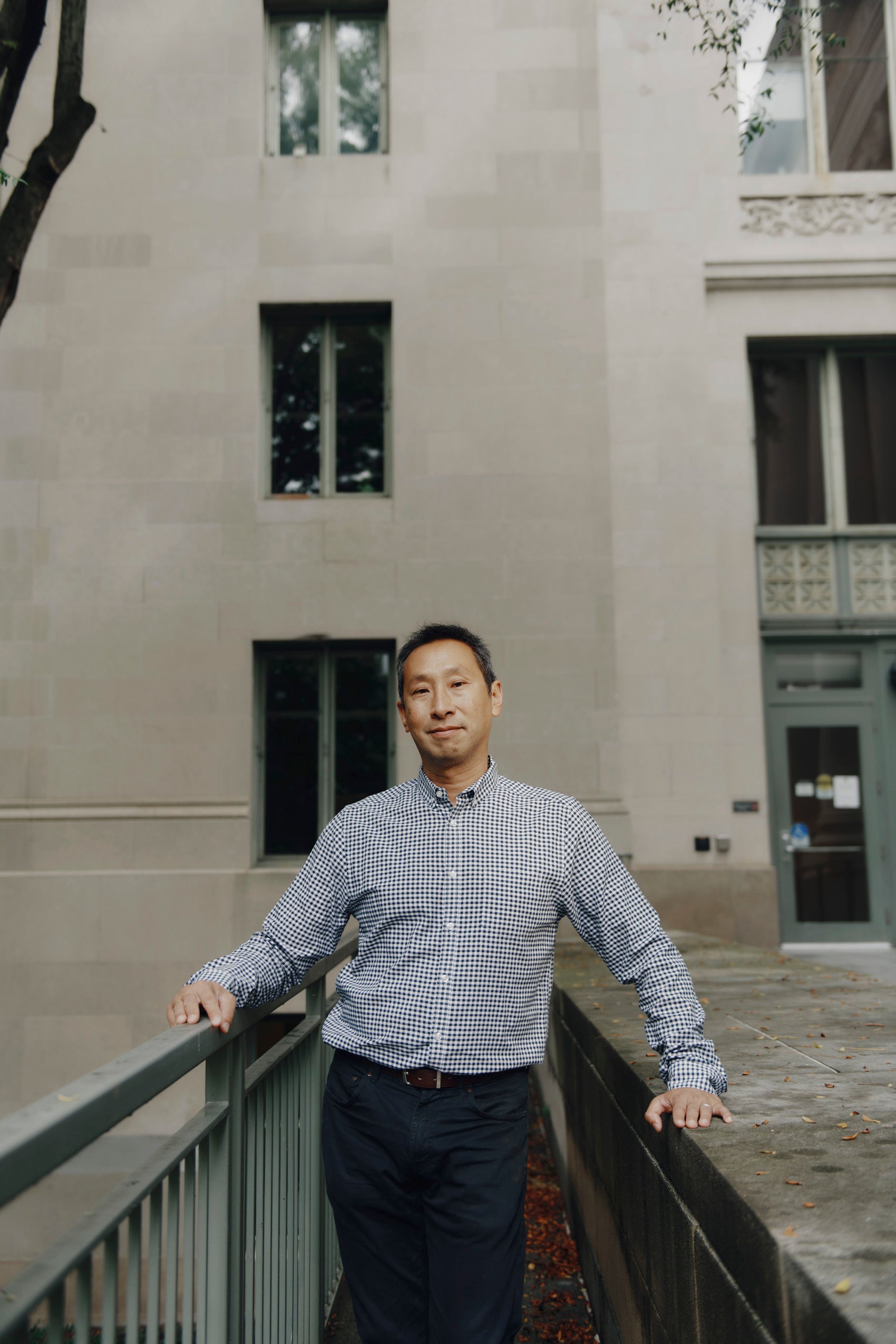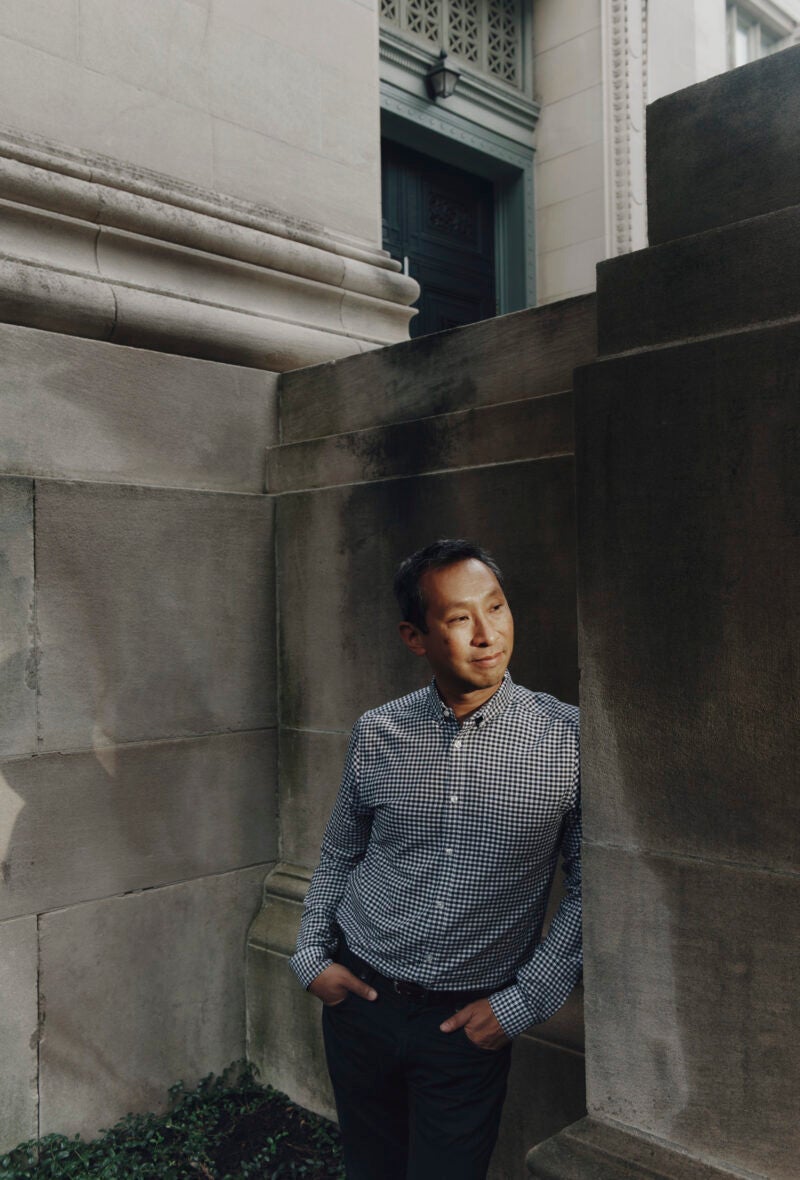It’s not always easy to catch up with Mark Wu. He’s often on the road, attending seminars around the globe to discuss international trade policy. When not traveling, he is busy teaching and researching the subject.
Trade policy may not sound like a flashy topic, but for Wu, it’s endlessly fascinating, greatly affecting how the world operates (a fact many experienced with the now-infamous “supply chain disruptions” of the COVID-19 pandemic) and how, he insists, it might operate better. Wu’s approach to his favorite subject is always the same. Whether it’s in an academic paper or a classroom debate, he brings his years of work and training and his interest in history, sociology, economics, and the law to bear on the complexities and impacts of international trade.
“I see my intellectual work as fostering an open dialogue that helps people understand that international trade is not nearly as simple as some of the economic models might lead us to believe,” said Wu, Henry L. Stimson Professor of Law, faculty director for Harvard’s Fairbank Center for Chinese Studies, and faculty co-director of the Berkman Klein Center for Internet & Society. Nor, he says, is an exclusive focus on efficiency necessarily the best lens through which to view the subject.
-Mark Wu
“I have always believed I live in an exciting but messy, turbulent time.”
Which way to proceed is not always clear, even to Wu. But he knows that getting people talking and asking questions are critical first steps. At Harvard Law School he teaches International Trade Law, International Business Law, and China and the International Legal Order, among other classes, pressing his students to consider alternative points of view.
Similarly, Wu’s research is filled with insightful queries that often predict the future. A 2014 article he co-wrote, titled “The Next Generation of Trade and Environment Conflicts: The Rise of Green Industrial Policy,” accurately predicted the growth of international trade disputes as national governments increasingly turned to industrial policy to spur green industry, often in violation of international trade rules. Less than a decade later, the Biden administration spearheaded passage of the Inflation Reduction Act, launching a host of new government economic and trade policies to promote, among other things, domestic green energy production and use.
In a 2016 paper, Wu warned that China’s economic structure was fundamentally different from that of other economies and could pose a serious threat to global trade governance if trade rules didn’t adapt accordingly. Two years later, a trade war between the United States and China erupted when then-President Donald Trump levied tariffs on Chinese imports. That war has only escalated as the Biden administration has continued to add sanctions.
Wu hopes his work will help people see that international trade is not as simple as some economic models suggest.
For Wu personally, the end goal has always been to make a difference. It’s the common thread that weaves through his time as an undergraduate and graduate student, as well as his work for the World Trade Organization, the Office of the United States Trade Representative, the Biden-Harris transition team, and Harvard Law School.
“I’ve always believed I live in an exciting but messy, turbulent time regarding shifts in global economic trends, technological innovation, and conflicts across political systems,” said Wu, fresh from a trip abroad for a Taylor Swift-related jaunt to England (he’s been a big Swiftie for over 15 years) followed by a visit to Switzerland to attend back-to-back conferences. “I think the common trend in my work is trying to find ways to make a difference in helping others both understand what is happening and think about how to stand up for what you think is the right way for societies to manage these turbulent times.”
In a way, Wu’s international focus comes naturally. As a child of immigrants, he was drawn to learning about China from an early age and spent his college years at Harvard helping plan and take part in conferences in different countries as part of the school’s Project for Asian and International Relations. While an undergraduate, he also took a gap year away from Cambridge to study in Japan.
After graduation, Wu was on the move again, first to Oxford as a Rhodes Scholar to immerse himself more fully in development economics. The work included time in Namibia, the focus of his thesis, which explored gender, health, and social development in the country.
Next up was a job with the World Bank in China. It was 1998 and a heady time for international money matters. The Asian financial crises, triggered in 1997 by financial imbalances and overvalued currencies, had plunged several countries in the region into recession. Simultaneously, China was negotiating to join the WTO. There was plenty to keep Wu busy, but he wasn’t content simply crunching numbers at a desk.
“I was very conscious of the fact that many economists churn through datasets and spend most of their time in the capital working with the finance ministry,” Wu said, “so I asked if I could also have an operational role on actual lending projects that were taking place elsewhere in China just to help me understand the complexity of the country.”
The fieldwork took him to some of the nation’s poorest and most underserved regions, where he observed officials helping locals bring running water into area homes for the first time or expanding a single-pit outhouse to a two-pit outhouse. He also signed on to projects tackling air pollution and sewage in major cities.
“It gave me a really good base for understanding just how diverse and complicated China is,” said Wu, “and the political system through which decisions affecting everyday lives were made.”
But it was a stint with the consulting firm McKinsey in San Francisco in the early 2000s that helped Wu really narrow his focus. He was studying the global semiconductor industry and its development in China when he had an epiphany.
“I realized that while I was fluent and interested in the business end, what was actually going to impact decisions around how this industry was going to evolve was on the trade policy and regulatory end, and that I wanted to make a career helping shape the development of those policies and rules, and how we navigate the different types of challenges that arise, given that there are really different competing interests at stake.”
Wu joined the Office of the U.S. Trade Representative, where he served as director for intellectual property and was the lead negotiator for the intellectual property chapters of several U.S. free trade agreements. But over time, he realized he needed a law degree to fully understand his chosen field. So, he left the job to attend Yale Law School. Soon after, he made the jump to academia.

“Teaching had always been among the options that I had considered,” said Wu. “Some of my closest friends are legal academics who had always encouraged me to pursue this type of path.”
It’s a path he is clearly well suited for. Wu is a past recipient of the Sacks-Freund Award for Teaching Excellence and the law school’s Student Government Teaching & Advising Award. In the classroom, he loves nothing more than to encourage his students to challenge their own perspectives. Wu said he has always been interested in understanding “why people see the world so differently and have such different desires for what they want this world to be.”
At Harvard, he is passing on that curiosity to his students. “I want them not to just be able to make arguments from two different sides,” he said, “but to understand what is really behind that argument that motivates people to have that point of view.”
He also embraces his role as a mentor to the next generation of leaders. Wu likes to think he is continuing in the tradition of one of his most important Harvard mentors, Archie Epps, the college’s former longtime dean of students. As a kid from a different socioeconomic background from that of many of his classmates, Wu says he often found himself struggling with a sense of belonging in his early Harvard years. But where Wu felt doubt, Epps, he recalls, saw his potential.
“I think he saw more in me than I saw in myself,” said Wu. “And he pushed you, not to just push yourself but to think about that in terms of service to others.”
Today, Wu considers being a mentor central to his Harvard role, helping students who may feel out of place or uncertain figure out how to navigate the system and take their next steps.
“If there is a small way I can help pay it forward for somebody else during my years here,” he said, “that’s an incredibly worthwhile thing.”
